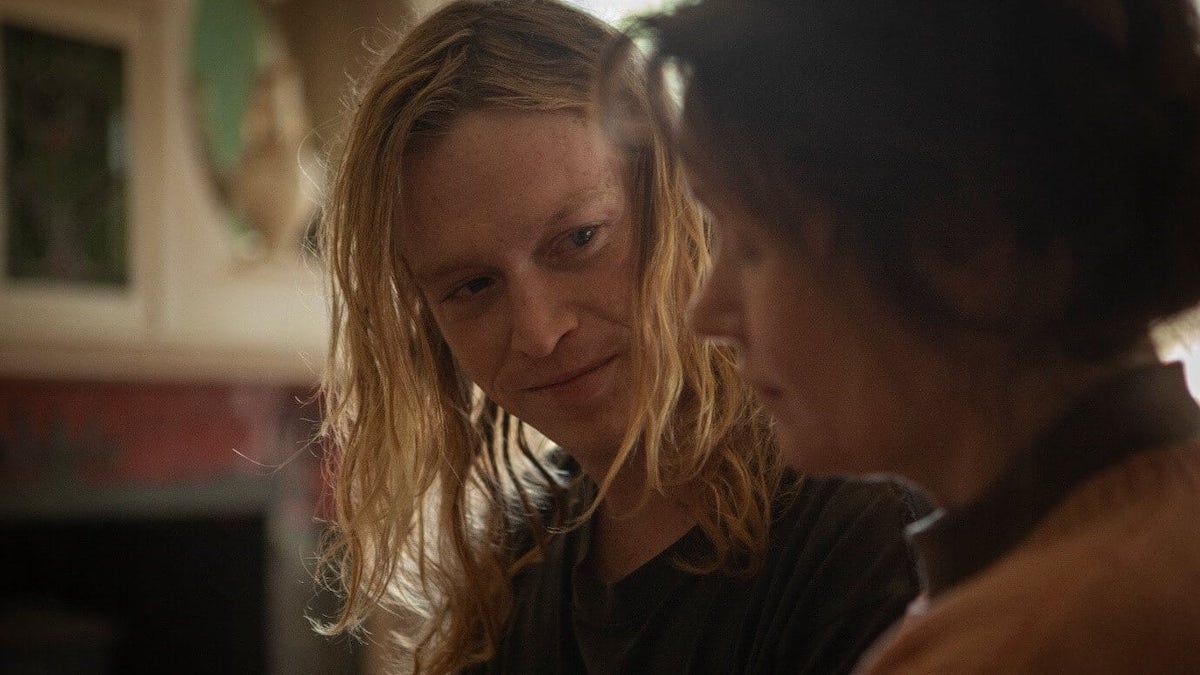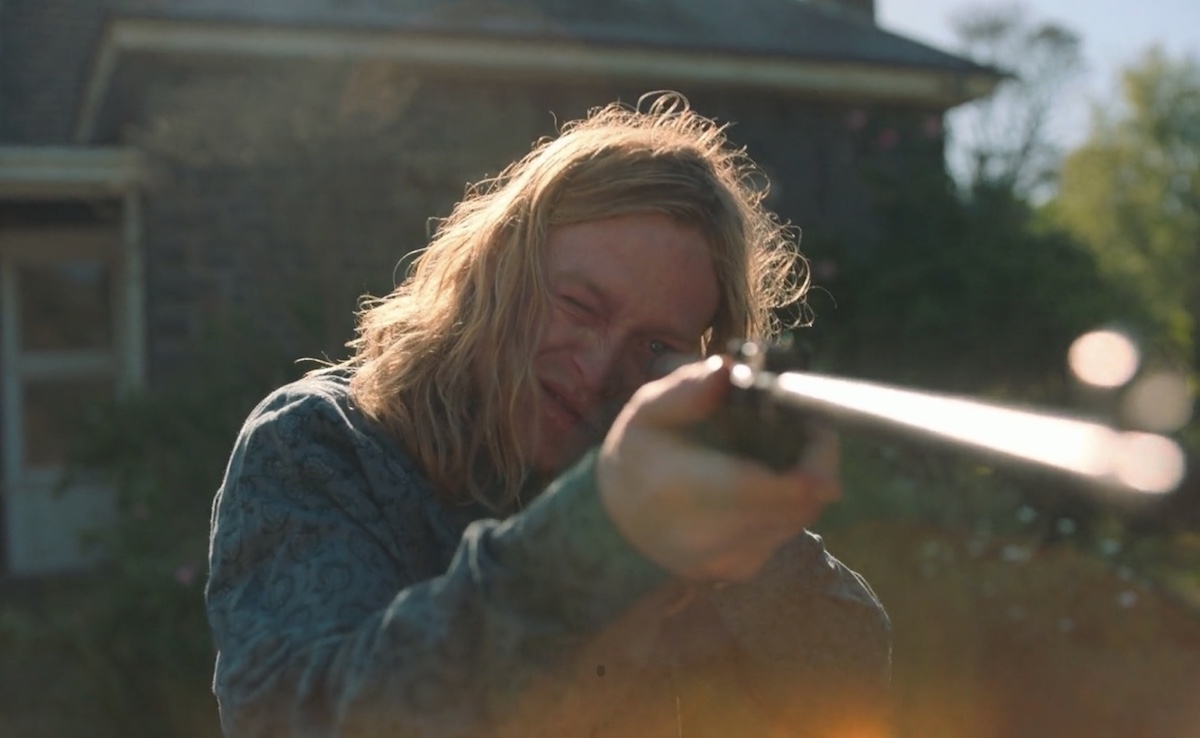NITRAM (2021)
Events leading up to the 1996 Port Arthur massacre in Tasmania, attempting to understand why and how the atrocity occurred.

Events leading up to the 1996 Port Arthur massacre in Tasmania, attempting to understand why and how the atrocity occurred.


We first see the eponymous Nitram (director Justin Kurzel never once uses his real name) as a kid on Australian television back in 1979. He’s in a hospital burns unit after accidentally injuring himself while playing with fireworks. The reporter asks if he’s learned his lesson and will be more careful in future, but the boy reveals he has no plans to stop goofing around with skyrockets and firecrackers. That theme of recklessness—of Nitram being out of control, a danger to himself and others—is revisited regularly during the tragic real-life story that then unfolds, which ends with him carrying out the worst mass shooting in Australian history.
In 1996, as a 28-year-old, Nitram (the gunman’s first name reversed) murdered 35 people and injured 23 others with weapons, including a semi-automatic AR-15, that he’d easily acquired from various sources in Port Arthur, Tasmania. Arrested and tried, he was ultimately given 35 life sentences plus 1,652 years without parole, in a case that quickly led to the radical redrafting of Australia’s lax gun laws. Kurzel’s film, from Shaun Grant’s screenplay, chronicles the months immediately before the massacre. It’s a brave work with a clear pro-gun-control message at its heart.

That said, whether such horrific events should be dramatised from the viewpoint of the perpetrator—even with the best intentions—remains very much up for debate. Families of Nitram’s victims (the youngest of which were only three and six-years-old) perhaps shouldn’t have to relive the terrible incident for the sake of what is, ultimately, a movie created to entertain and make money for its backers. Sadly, it’s easy to see Nitram as an exploitative undertaking and the fact those murdered receive no real acknowledgement in the course of the film’s 112-minute running time doesn’t help alter that perception. Its frequently sympathetic depiction of the killer helps even less.
For British audiences, it would seem about as insensitive as making a movie about the gunman behind the Dunblane Primary School massacre, which took place barely a month before the Port Arthur attack. There are unsettling echoes of that event here, the suggestion being it had inspired Nitram’s own actions. In a news report we half-see during the film, the Dunblane killer is described as “a misfit, a loner, an oddball, a weirdo…” and realise the exact same words will be used about Nitram (Caleb Landry Jones) after his own rampage. It’s one of many haunting moments that foreshadow the brutal finale, including a conversation about Nitram’s TV appearance as a youngster and how he “isn’t famous anymore” (he’s about to be again), a line from a Gilbert and Sullivan operetta (“my eyes are fully opened to my awful situation”), and a story his mum tells about a cruel prank he played on her as a child (“he was laughing at my pain”). His fascination with an air rifle and entreaties to wealthy best friend Helen (Essie Davis) that she buy him a “real gun” merely underline the terrors we know are coming.

Films concerning those with intellectual disabilities—such as Rain Man (1988) and I Am Sam (2001)—are, by their very nature, going to cast their subjects in a sympathetic light. It’s unavoidable. If you take that as read, however, the question becomes just how sympathetic is it possible to depict Nitram without being accused of making excuses for him or insulting the memory of those he killed? ‘Slow’, directionless, and lonely, he’s both a figure of fun and annoyance to the local community. He lets off fireworks, grabs the steering wheel when Helen is test-driving a car, and pesters people to give him odd jobs. He’s a pain in the arse but he’s also hard to actively dislike. One’s empathy only deepens as we move further into the film and the depth of his isolation and the consequences of his recklessness come fully into focus. Lord alone knows what the victims’ families would make of Helen’s description of Nitram as, “Considerate… helpful… funny—he’s a special man and a good friend” but there are times when you believe her.
Landry Jones (Get Out)—“Hollywood’s go-to oddball” as Vulture put it back in 2017—won the ‘Best Actor’ award at Cannes for his portrayal and it’s easy to see why. With his vacant, goofy expression and greasy long blond hair, Landry Jones’ Nitram could pass for the lead singer of some dumb heavy metal band. There’s an innocence and vulnerability to him, albeit shot through with barely suppressed rage and clear frustration. Nitram, who was diagnosed with Asperger syndrome post-incarceration, has a childlike reaction to adversity, a bull-in-a-china-shop mentality that never considers consequences or other people’s feelings. But his isolation is palpable and heart-breaking, especially later in the film, after he comes into some money, and asks a female travel agent he has only just met if she’d like to accompany him to Los Angeles.
As well as being a character study and the chronicle of a terrible moment in Australian history, Nitram is in many ways a family drama. The excellent Judy Davis (mum) and Anthony LaPaglia (dad) are as crucial to the ensemble as Landry Jones and Essie Davis are. There’s tension between mother and father when it comes to their son’s behaviour, as Davis is too strict and LaPaglia isn’t strict enough. Neither are particularly good at communicating with their son; they fail to truly appreciate his unhappiness or realise what he might be capable of. In one early scene, we see a doctor who suggests taking him off his medication, but his mum resists because she’d rather keep him docile than actually talk to him or face his problems head-on. She criticises her son endlessly (get your hair cut, change your dirty trousers…) and even bars him from a funeral when he turns up dressed inappropriately in a strange hat and tie. His strained relationship with his mum is crucial to Nitram’s problems and it’s little surprise when he sees Helen as a surrogate mother and no coincidence that the travel agent he invites to L.A. is also an older woman.

With her big, rambling house, pack of boisterous dogs and amusing Gilbert and Sullivan obsession, lottery heiress Helen gives the film a lighter dimension. Kurzel even permits himself moments of humour as Nitram walks her mutts and she teaches him how to play ‘Chopsticks’ on the piano. But even here, there are tensions; an argument over an air rifle, a tense meeting between Helen and Nitram’s mother, a row with a car salesman. Whether she wants to be his lover, his mother or just his pal, we are never quite sure. Helen is the only person who accepts him for who he is and when she is no longer around, Nitram’s world starts to unravel like a cheap sweater. But he doesn’t turn his anger inwards on himself, as those contemplating suicide would, he turns it outwards at those he blames for hurting him and his family, including the couple who gazumped them on a property deal.
Although it’s the performances that rightfully take centre stage and have claimed the lion’s share of the plaudits, just as satisfying are some of Kurzel’s neat storytelling touches. His use of music to illustrate Nitram’s breakdown is particularly effective—the giddy operetta of Gilbert & Sullivan on Helen’s record player giving way to the same songs at half-speed, lending them a hellish quality before even that vague tunefulness is banished in favour of ear-pummelling static. The director uses surfing as a metaphor for the ‘normal’ life Nitram desires and can never have, his one attempt at taking a board out onto the waves ending with him spluttering and choking back on the shore. The cherry on top, though, is Kurzel’s devastating final shot, which will surely stay with audiences for a long time.
The director—a regular chronicler of Australian criminality in the likes of Snowtown (2011) and True History of the Kelly Gang (2019)—is interested in what Nitram did but not nearly as much as why. It takes a village to raise a child, as the saying goes, but a village can also thoroughly screw one up. Nitram was failed by the system and his parents, rejected by his cosy, suburban community, and able to get hold of firearms far too easily (there’s a scene in a gun store that is positively surreal). It’s a recipe for disaster we’ve seen time and again, particularly in the US. But Kurzel never really tackles the question of where Nitram’s personal responsibility for his actions begins and ends—sometimes too much understanding is as bad as too little. So while this is a film filled to bursting with admirable qualities and fully deserving of its four-star rating, whether it should exist at all is likely to be debated for years to come.
AUSTRALIA | 2021 | 112 MINUTES | 1.55:1 | COLOUR | ENGLISH


director: Justin Kurzel.
writer: Shaun Grant.
starring: Celeb Landry Jones, Essie Davis, Judy Davis, Anthony LaPaglia.
